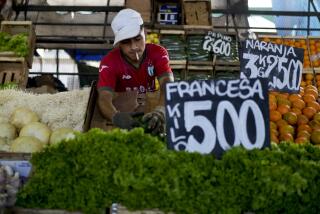Housewives Join Effort to Enforce Price Freezes : Brazil Lines Up to Fight Inflation
RIO DE JANEIRO — As banks reopened Monday and the era of the cruzado began, Brazilians started dropping three zeros from all money calculations and became zealous guardians of stable prices in the government’s fight against inflation.
The cruzado, Brazil’s new currency, is the symbol of a crusade launched Friday by President Jose Sarney to end Brazil’s chronic and accelerating inflation.
There has been massive support in this nation of 135 million people for the new anti-inflation policy, which includes a one-year freeze on prices. A weekend public opinion survey in Sao Paulo showed that 88% approved of Sarney’s new economic policy.
Housewives, armed with official price lists, have become militant price inspectors. And, in encounters at supermarkets, customers have made citizens’ arrests of store managers for price violations.
Some commentators compare the national reaction to the demonstrations by millions of Brazilians supporting direct popular elections in early 1984 that ended 20 years of military rule when the late Tancredo Neves was elected president.
Neves died before taking office and Sarney, his vice president, took over the presidency a year ago. Now, with his bold attack on inflation, Sarney is being referred to here as a statesman, not just a stand-in.
During his first 11 months in office, Sarney rekindled economic growth, which reached 7% last year. But inflation also grew, with prices rising 15% a month in January and February.
Political Stakes
The depth of public reaction to the inflation issue makes this the key to the success or failure of Brazil’s democratic government.
If Sarney and his economic advisers, led by Finance Minister Dilson Funaro, break the inflation spiral without producing economic recession, the governing center-left coalition can expect to win November’s congressional and gubernatorial elections.
If not, more radical left-wing parties seem likely to grow in strength. These parties want Sarney removed and new presidential elections next year.
Sarney’s present six-year term can be shortened by a constitutional assembly that is to be elected in November.
The main party in Sarney’s coalition, the Brazilian Democratic Movement, which controls the Senate, has announced full support for Sarney’s anti-inflation program.
The major national labor union confederations have been critical of the wage controls that are part of the program. But the Sarney government has instituted unemployment insurance for the first time in Brazil and is providing an 8% bonus to all workers covered by labor contracts whose wages are now fixed for a year.
Government officials said the goal of the cruzado plan is “zero inflation.” Funaro claims that the federal budget is in balance after a big increase in tax revenue, and he said the government will neither borrow nor issue new money before July.
During the weekend, Brazil reached an agreement with its major foreign creditors, who hold $100 billion in debt, to refinance more than $15 billion that was to have been paid by the end of 1986 with reduced financial costs and to extend $16 billion in short-term lines of credit for another year.
The partial debt refinancing and the buoyancy of the domestic market are auspicious circumstances for the launching of the cruzado, which began its existence with a convertibility of one cruzado for 1,000 cruzeiros, the previous currency.
All private bank balances that had been denominated in cruzeiros lost three zeros, and the accounts were converted to cruzado accounts when banks reopened after Friday’s bank holiday.
The official rate of exchange for the cruzado is 13.8 to the U.S. dollar. On the black market, dollars were being bought in small lots Friday for 20,000 cruzeiros, the equivalent of 20 cruzados.
Traders who made any sales Monday were paying 14 to 16 cruzados, indicating a strengthened Brazilian currency.
Stock markets remained closed Monday while brokers tried to figure out how to trade in “penny stocks” that now have to be priced in tiny fractions of one cruzado or sold in lots of 1,000. The new policy is expected to push up stock prices as money leaves the financial markets, where issues no longer enjoy “monetary correction,” a now-abandoned policy of offsetting inflation.
Supermarkets closed Monday morning to put new official price tags on all products. During the weekend, rioting was reported in several markets where customers protested illegal price increases.
Sarney met with Brazil’s 26 state and territorial governors and said he wants officials and the public to be “vigilant but not violent” in surveillance of the price freeze. He promised to prosecute violators.
More to Read
Sign up for Essential California
The most important California stories and recommendations in your inbox every morning.
You may occasionally receive promotional content from the Los Angeles Times.










